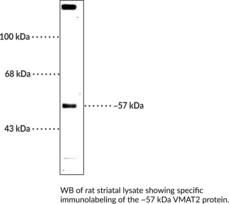Territorial Availability: Available through Bertin Technologies only in France
- Correlated keywords
- Product Overview:
Vesicular monoamine transporter 2 (VMAT2) is a member of the SLC18 family of transporters that is encoded by SLC18A2 in humans.{55233} VMAT2 is expressed in monoaminergic neurons of the central and peripheral nervous systems and localizes to synaptic vesicles where it transports cytosolic dopamine (DA), serotonin (5-HT), norepinephrine (NE), and histamine into synaptic vesicles, regulating cytoplasmic levels and exocytosis of monoamine neurotransmitters. It consists of 12 transmembrane helices, which contain a luminal loop subject to N-glycosylation, as well as cytoplasmic N- and C-terminal domains that regulate monoamine transport and VMAT2 localization, respectively.{54273} Homozygous knockout of Slc18a2 completely eliminates brain DA, 5-HT, and NE and induces postnatal lethality in mice.{54274} Slc18a2+/- mice exhibit increased apomorphine-, cocaine-, amphetamine-, or ethanol-induced horizontal locomotor activity compared to wild-type mice. Slc18a2 overexpression decreases immobility time in the forced swim test and marble burying in mice.{54275} Slc18a2 overexpression also reduces the loss of dopaminergic neurons in a mouse model of Parkinson’s disease induced by MPTP. SNPs in SLC18A2 have been found in individuals with bipolar disorder, schizophrenia, drug addiction, and Parkinson’s disease.{55233} Cayman’s VMAT2 (C-Term) Polyclonal Antibody can be used for Western blot (WB) applications. The antibody recognizes VMAT2 at approximately 57 kDa from human and rat samples.
Cayman Chemical’s mission is to help make research possible by supplying scientists worldwide with the basic research tools necessary for advancing human and animal health. Our utmost commitment to healthcare researchers is to offer the highest quality products with an affordable pricing policy.
Our scientists are experts in the synthesis, purification, and characterization of biochemicals ranging from small drug-like heterocycles to complex biolipids, fatty acids, and many others. We are also highly skilled in all aspects of assay and antibody development, protein expression, crystallization, and structure determination.
Over the past thirty years, Cayman developed a deep knowledge base in lipid biochemistry, including research involving the arachidonic acid cascade, inositol phosphates, and cannabinoids. This knowledge enabled the production of reagents of exceptional quality for cancer, oxidative injury, epigenetics, neuroscience, inflammation, metabolism, and many additional lines of research.
Our organic and analytical chemists specialize in the rapid development of manufacturing processes and analytical methods to carry out clinical and commercial GMP-API production. Pre-clinical drug discovery efforts are currently underway in the areas of bone restoration and repair, muscular dystrophy, oncology, and inflammation. A separate group of Ph.D.-level scientists are dedicated to offering Hit-to-Lead Discovery and Profiling Services for epigenetic targets. Our knowledgeable chemists can be contracted to perform complete sample analysis for analytes measured by the majority of our assays. We also offer a wide range of analytical services using LC-MS/MS, HPLC, GC, and many other techniques.
Accreditations
ISO/IEC 17025:2005
ISO Guide 34:2009
Cayman is a leader in the field of emerging drugs of abuse, providing high-purity Schedule I-V Controlled Substances to federally-licensed laboratories and qualified academic research institutions for forensic analyses. We are certified by ACLASS Accreditation Services with dual accreditation to ISO/IEC 17025:2005 and ISO Guide 34:2009.





